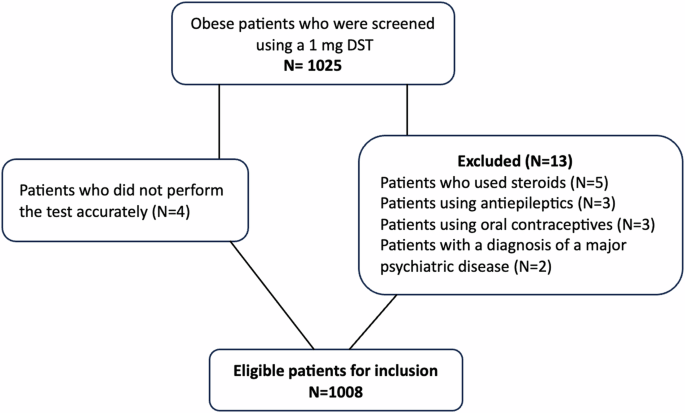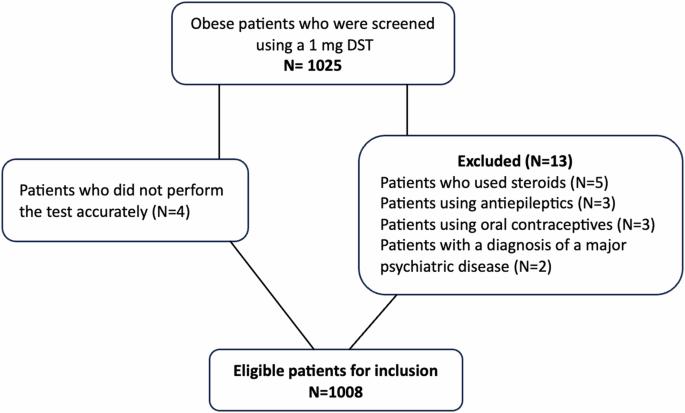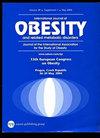Cushing’s syndrome screening with the 1-mg dexamethasone suppression test in metabolically healthy and unhealthy obesity phenotypes
IF 4.2
2区 医学
Q1 ENDOCRINOLOGY & METABOLISM
引用次数: 0
Abstract
The ongoing debate regarding the need for screening Cushing’s syndrome (CS) in patients with obesity continues. The objectives of this study were to establish the prevalence of CS in the population with obesity and assess how metabolic health status influences cortisol levels following the 1 mg dexamethasone suppression test (DST). This retrospective study included 1008 patients with obesity who underwent screening with the 1 mg DST for CS. These patients were categorized into two groups as metabolically healthy obesity (MHO) and unhealthy obesity (MUO). Out of the 1008 patients, 779 (77.3%) belonged to the MUO group. Within the entire study cohort, 12 (1.2%) patients exhibited a cortisol level of ≥ 1.8 after the 1 mg DST. Cortisol levels following the 1 mg DST were also significantly higher in the MUO group than in the MHO group (p = 0.001). Among these 12 patients, 11 were presenting a MUO phenotype. Hypercortisolism was definitively diagnosed in two patients, resulting in an overall prevalence of 0.2%. The 1 mg DST demonstrated a specificity of 99% and 100% sensitivity for screening for CS. While the 1 mg DST is a practical screening test for CS with high specificity in obesity, the number of CS cases detected remains relatively low. Therefore, it may be more reasonable and applicable to screen patients with MUO phenotype rather than all individuals with obesity.


通过 1 毫克地塞米松抑制试验筛查代谢健康和不健康肥胖表型中的库欣综合征。
背景:关于是否需要对肥胖症患者进行库欣综合征(CS)筛查的争论仍在继续。本研究的目的是确定库欣综合征在肥胖人群中的患病率,并评估代谢健康状况如何影响 1 毫克地塞米松抑制试验(DST)后的皮质醇水平:这项回顾性研究纳入了 1008 名接受 1 毫克地塞米松抑制试验 CS 筛查的肥胖症患者。这些患者被分为代谢健康肥胖(MHO)和不健康肥胖(MUO)两组:在 1008 名患者中,有 779 人(77.3%)属于 MUO 组。在整个研究队列中,有 12 名患者(1.2%)在服用 1 毫克 DST 后皮质醇水平≥ 1.8。在 1 毫克 DST 后,MUO 组的皮质醇水平也明显高于 MHO 组(p = 0.001)。在这 12 名患者中,有 11 人表现为 MUO 表型。两名患者被确诊为皮质醇过多症,总患病率为 0.2%。1 毫克 DST 对 CS 筛查的特异性为 99%,灵敏度为 100%:结论:虽然 1 毫克 DST 是一种实用的 CS 筛查测试,对肥胖症具有较高的特异性,但发现的 CS 病例数量仍然相对较少。因此,筛查具有 MUO 表型的患者可能比筛查所有肥胖症患者更合理、更适用。
本文章由计算机程序翻译,如有差异,请以英文原文为准。
求助全文
约1分钟内获得全文
求助全文
来源期刊

International Journal of Obesity
医学-内分泌学与代谢
CiteScore
10.00
自引率
2.00%
发文量
221
审稿时长
3 months
期刊介绍:
The International Journal of Obesity is a multi-disciplinary forum for research describing basic, clinical and applied studies in biochemistry, physiology, genetics and nutrition, molecular, metabolic, psychological and epidemiological aspects of obesity and related disorders.
We publish a range of content types including original research articles, technical reports, reviews, correspondence and brief communications that elaborate on significant advances in the field and cover topical issues.
 求助内容:
求助内容: 应助结果提醒方式:
应助结果提醒方式:


